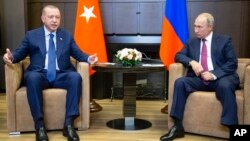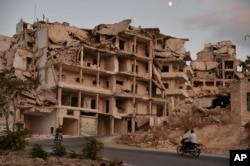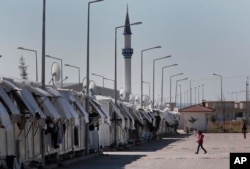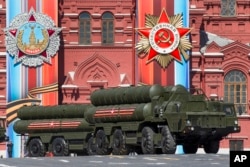Russia is hosting a three-way summit this week on Syria even as growing diplomatic differences between two participants threaten to undermine the event.
Thursday's talks on the Black Sea resort of Sochi involve Russia, Turkey and Iran; however, Moscow and Ankara are at odds over border security and other concerns.
Moscow is demanding “decisive action” from Ankara over Idlib, the last remaining rebel-controlled Syrian enclave, while Ankara is pressing for support for its demand to create a safe zone in Syria to protect the Turkish frontier.
While Russia and Iran back Syrian President Bashar al-Assad, and Turkey supports Syrian rebels, the countries have found common ground in efforts to end the civil war under the auspices of the so-called “Astana Process.”
Strained cooperation
Analysts, however, say the conflicting agendas of the countries could put increasing strain on cooperation. Moscow is voicing frustration with Ankara over Idlib. "Turkey must do more to uphold its agreement and clear hard core jihadist fighters from Idlib,“ said Russian Foreign Ministry spokesperson Maria Zakharova last week.
Turkey and Russia hammered out a deal in September in which Ankara guaranteed that radical jihadist groups would disarm and leave the enclave. The agreement saw Moscow prevail on Damascus to step back from launching an imminent military offensive to seize the enclave.
In December, however, radical Islamic groups seized large parts of Idlib, ousting moderate Syrian opposition groups backed by Turkey.
Russian Defense Minister Sergei Shoigu met with his Turkish counterpart, Hulusi Akar, Monday in Ankara in a bid to resolve differences over Idlib ahead of the Sochi summit. “I hope that today, we will be able to come to an agreement on the key issues,” Shoigu said ahead of the discussions.
A joint statement following the defense ministers' Monday talks indicated no breakthrough, with both sides only committing themselves to continue to work together. “Ankara does not have much space to maneuver,” said political scientist Cengiz Aktar. “It will be very difficult to escape the duty of cleaning the Idlib pocket, which is packed with radical jihadists of all sorts.”
Analysts say Ankara is aware that a collapse of its Idlib deal with Moscow would open the door to Syrian government forces attacking the enclave. “There's the fear that there would be a flow of one million refugees into Turkey if there was an operation; so far this has not happened, thanks to the deal with Moscow,” said international relations professor Huseyin Bagci of Ankara’s Middle East Technical University.
Refugee issue
Turkey already hosts more than 3 million Syrian refugees, at a cost Ankara claims of over $30 billion. According to Turkish opinion polls, frustration over the refugees is regularly cited by respondents as one of the main problems facing the country.
With Turkish President Recep Tayyip Erdogan's ruling AKP facing possible significant losses in crucial local elections in March, analysts suggest his priority could be to delay any offensive against Idlib.
“They are playing for time, and sooner or later this pocket will be emptied,” said Aktar, adding, “For Erdogan, he will be eager to avoid this at least until after next month’s local elections.”
So far there are no reports of Syrian government forces starting to mobilize against Idlib. Such an operation against so many battle-hardened jihadists estimated to number in the tens of thousands would likely need the support of Russian air power.
Careful approach
Analysts suggest Moscow may not be ready to risk a rupture of its recent deepening relationship with Ankara over Idlib. Putin is aware of the alarm in NATO of his warm relationship with Erdogan.
Turkey is set to buy Russia’s S-400 missile system, which is due to be delivered later this year despite warnings from Washington of possible sanctions against its NATO ally Turkey. The U.S. says the missile system could compromise NATO weapons systems.
Turkey-U.S. relations remain deeply strained over Washington's backing of a Syrian YPG Kurdish militia deemed by Ankara as terrorists in its war against the Islamic State. U.S. President Donald Trump’s proposal to create a safe zone in Syria to protect Turkey’s Syrian frontier initially defused bilateral tensions.
The lack of progress on the zone’s creation, however, has resulted in Ankara threatening to create the region unilaterally. Analysts say such a move would need Moscow’s backing. Erdogan is expected to press the issue at the Sochi summit.
Ahead of the Sochi summit, Turkish Defense Minister Akar is scheduled to meet acting U.S. Defense Secretary Pat Shanahan, on the sidelines of a NATO meeting in Brussels on Wednesday.
“Turkey must talk to the Americans and Russians, as both support the Kurds, this is the dilemma facing Ankara, said Bagci. “The Americans are against a Turkish intervention in Syria and Putin in not supporting Turkey on this.” Bagci was referring to Russian President Vladimir Putin.
Former senior Turkish diplomat Aydin Selcen, who served widely in the region, suggests Ankara may yet be able to find a compromise. “It's give and take for Putin,” said Selcen.“
“Ankara will need to seriously do its homework for Idlib and take steps against the radical groups, and on the other hand, there will be a yellow light for operations against the YPG militia. Not a full-scale operation but rather more limited operations or some airstrikes, unless Damascus and Moscow pull those YPG elements away from the Turkish frontier.”








